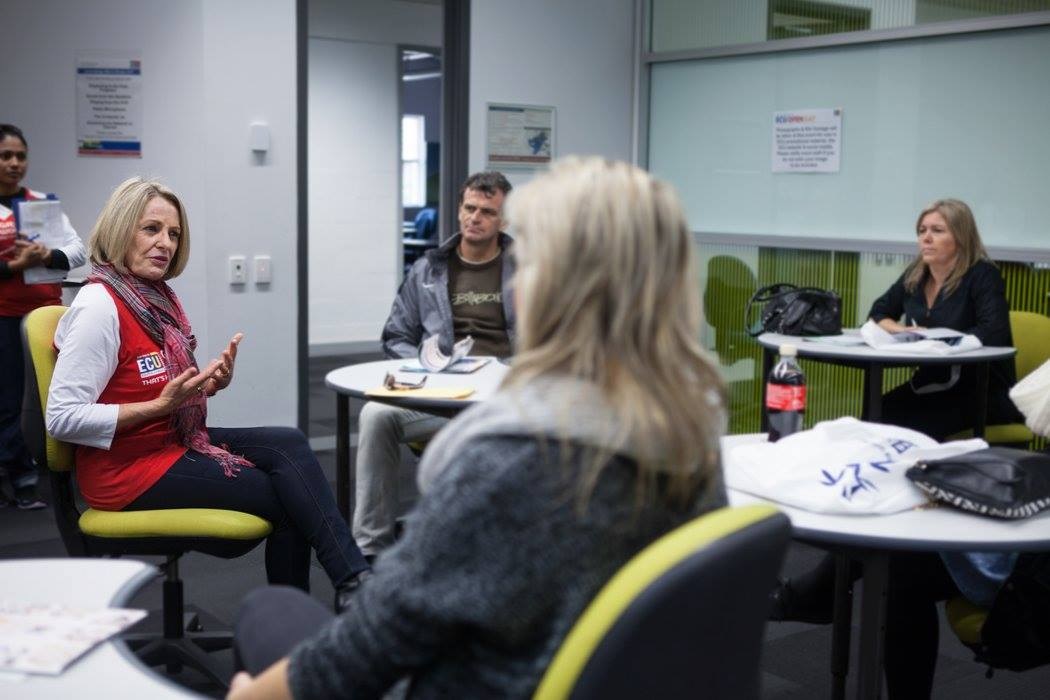An intervention for addiction is when friends, family and loved ones get together to confront an individual about a dependency they have.
Often, someone will go to great lengths to disguise that they have an addiction.
They can become dishonest and distant and even take a step back from activities and hobbies that they once enjoyed.
It is often the case that the person struggling with an addiction has not admitted to themselves that they have developed a problem or has not recognised that they need help or treatment.
Watching someone you care about fall into the hands of an addiction can be upsetting and stressful.
It is normal to struggle with your emotions as you deal with their dependency and try to get your head around it.
Not only are you worried about their mental and physical health, but you will also be worrying about their safety.
On top of that, you may be struggling with feelings of anger, guilt and resentment.
Addiction is notoriously difficult – not just for the one struggling with the dependency, but also for the people surrounding them.
This is where an intervention for addiction comes in.
Staging an intervention is not an easy decision to come to, and it is often done when those around the person have almost reached a breaking point.
At Rehab 4 Addiction, we are here to help. We’re available 24 hours a day, 7 days a week, ready to take your call.
If you have any questions about intervention and want to speak to a friendly and non-judgemental addiction specialist, call us today on 0800 140 4690.

You can stage an intervention to help someone with any sort of addictive behaviour or dependency.
The most common types of addiction are alcohol and drug addictions, however, other addictions that you can stage an intervention for are:

Finding the right time to approach a loved one about their problematic behaviour is not easy.
On one hand, you want to reach out to them, let them know you care, and offer to get them help and treatment for their addiction.
However, on the other hand, you don’t want to risk upsetting them, making them retreat from you, or push them further into the arms of their dependency.
The one thing you need to remember when thinking about staging an intervention for addiction is that although this will be difficult for everyone involved, ultimately, you could be saving this person’s life.
If you have any questions about intervention and want to speak to a friendly and non-judgemental addiction specialist, call us today on 0800 140 4690.

If you are concerned enough that you are considering an intervention, then it is safe to assume that the situation is becoming worse. It will not get better on its own.
Ultimately, the right time will differ for each family. However, to time your intervention correctly, you will need to consider:

Staging an intervention can be an overwhelming task. It is important to be as prepared as possible.
Before you stage the intervention, you may want to set up a WhatsApp group or have another way for everyone that is going to be able to communicate in the weeks and days leading up to the intervention.
This will ensure that you are all on the same page and there is no confusion on the day.
Some tips for a successful intervention for addiction are:

As many of us will be inexperienced in planning an intervention for addiction, it is helpful to have a checklist of things to cover when preparing to confront your loved one.
You want to do this the right way, and it may be beneficial to make a list and tick things off as you go to make things go as smoothly as possible.
If you have any questions about intervention and want to speak to a friendly and non-judgemental addiction specialist, call us today on 0800 140 4690.


An intervention will be stressful enough without saying or doing things that will only pour gasoline on the fire.
The person will likely feel ganged up on and judged, so using words such as ‘failure’, ‘junkie’, ‘addict’ etc are not going to be helpful.
It is important that your loved one knows that they are not being judged and that you are just looking out for them.
Try not to get upset. An intervention for addiction is a highly emotional and difficult experience for everyone involved, but ultimately, it is about the person you are trying to help.
If everyone becomes emotional, the subject will be lost in the emotion.
Do not invite too many people. As previously mentioned, this experience will be emotional enough with a small group of trusted loved ones.
Having too many people will be too overwhelming for everyone.
Do not stage the intervention when the person is intoxicated. This may mean having to reschedule the intervention on more than one occasion.
While that will be stressful, it will be a waste of time confronting a person who is under the influence.

When you are planning an intervention, you are under immense pressure to get every detail right. This includes making sure you invite the right people.
However, there is no list on the internet that can tell you who to invite because each person will feel a closeness to different groups of people.
The best way to figure out who to invite is to think of the person you are doing this for, and then think of the people who are closest to that person. Those are your attendees.
It can also be helpful to think outside the box. After all, not everyone is close to their parents or siblings.
Some people to keep in mind when putting together the list of attendees are:
Try to avoid inviting people who are highly emotional or who have strong negative emotions towards the person you are trying to help as this can lead to disaster.

If you have decided that you want to use the services of a professional interventionist to help you stage your intervention for addiction, there are several ways you can go about doing that.
If you have any questions about intervention and want to speak to a friendly and non-judgemental addiction specialist, call us today on 0800 140 4690.

When you are staging an intervention, it is a good idea to come armed with information about what treatments are available that can help your loved one.
However, you will not be expected to come up with a treatment plan.
Plans to help tackle an addiction are created by addiction specialists and are not commonly given at an intervention for addiction.
If your loved one agrees to attend a drug and alcohol rehab facility, they will undergo a full psychological assessment upon check-in and a treatment plan will be created from there.
This will vary depending on the mental and physical health of the person, the substance they are addicted to, and the severity of their addiction.
If they refuse to attend an inpatient drug and alcohol rehab facility but agree to get professional help, you should go with them to visit their GP.
From here, the GP can refer them to a local drug and alcohol team or to a clinic for outpatient appointments and any other treatment they deem necessary.

Unfortunately, it is a possibility that your loved might refuse to admit that they have a problem and insist that the intervention for addiction has been a waste of time.
While this will be incredibly disappointing, it is a good idea to emotionally prepare yourself for this outcome before going in to the intervention.
If you decided to hire a professional interventionist, they will teach you ways in which you can take a step back from the person while protecting your own emotions.
This includes things such as not lending them money, not giving them lifts to the bar and not phoning in sick to work on their behalf.
This way, they will be forced to live with the negative consequences of their addiction and will hopefully begin to see that they do need help.
Intervention can always be revisited at a later date when the person seems more ready.

When someone you love is struggling with an addiction, it is easy to forget about your own mental health needs.
Everything becomes about what that person wants and needs, and your whole life can feel like it revolves around someone else.
As mentioned above, a professional interventionist can help you with this by teaching you ways to make sure the person is dealing with their own actions.
However, you also need to make sure that you and anyone around the person is safe.
If the person is known to become volatile or violent when they are under the influence, do not be afraid to leave the house or phone the police if necessary.
We can help support you too.
Rehab 4 Addiction do not only provide help and advice for people struggling with addiction, we also provide help and support to those around them.
Addiction can tear families apart, and we understand the massive strain it can out on relationships.
If you have any questions about addiction, intervention or treatments, and want to speak to a friendly and non-judgemental addiction specialist, call us today on 0800 140 4690.